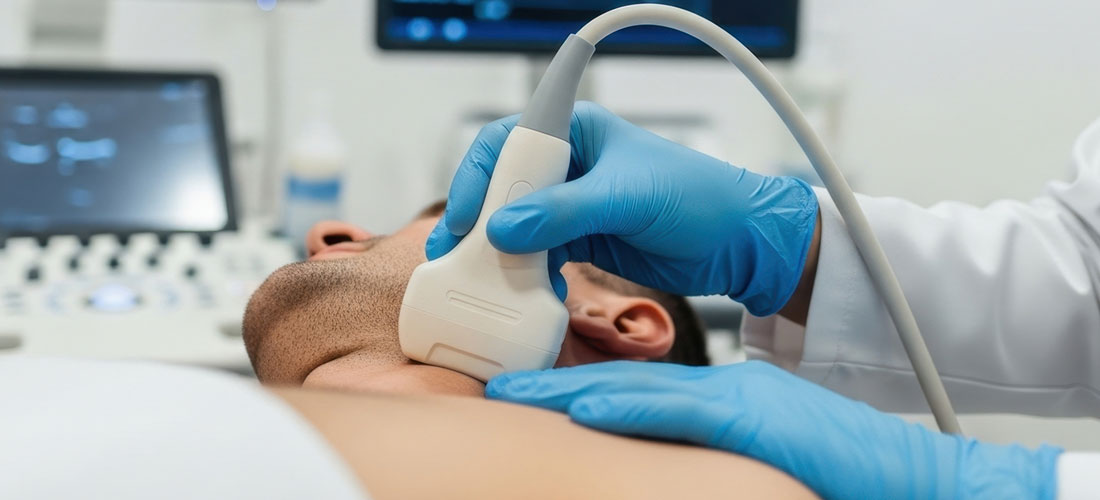Transcarotid Artery Revascularization (TCAR)
Carotid arteries supply oxygen-rich blood to the brain, face, and neck. When these arteries become narrowed or blocked by fatty deposits (plaques), it leads to Carotid Artery Disease (CAD)—a serious condition that increases stroke risk.
To treat this safely, Transcarotid Artery Revascularization (TCAR) offers a minimally invasive option. TCAR reopens the narrowed artery using a stent, helping restore blood flow to the brain and reducing stroke risk.
At RIVEA, patients can access TCAR as an advanced and less invasive option for treating carotid artery disease.
When is TCAR performed?
TCAR is usually recommended if the patient has been diagnosed with carotid artery disease.
TCAR may be recommended for individuals under the following conditions:
- Moderate to severe narrowing of the carotid artery.
- Increased risk for traditional open surgery due to factors such as advanced age, cardiac or pulmonary conditions, or previous surgeries in the neck area.
- Significant arterial blockage detected through imaging tests, such as carotid ultrasound or CT angiography
Understanding TCAR
Who Is a Candidate for TCAR?
Transcarotid Artery Revascularization (TCAR) may be recommended in the following situations:
- Diagnosis of carotid artery disease (CAD) has been confirmed.
- Considered high risk for traditional open surgery, such as carotid endarterectomy, due to factors like advanced age, anatomical challenges, or significant cardiac or pulmonary conditions.
Screening may be advised when the following risk factors are present:
- High blood pressure
- Diabetes
- Obesity
- Smoking history
- Presence of vascular disease in other parts of the body
Immediate medical attention is critical if any stroke warning signs appear, including:
- Sudden vision loss or difficulty seeing
- Sudden difficulty speaking or understanding speech
- Sudden numbness or weakness in the face, arm, or leg, especially on one side
- Sudden dizziness, loss of balance, or trouble walking
- Sudden severe headache with no known cause
How to Prepare for TCAR
Before a Transcarotid Artery Revascularization (TCAR) procedure, the healthcare team provides detailed guidance to support proper preparation. A meeting with the vascular surgeon is arranged to explain the procedure, address any concerns, and share essential preoperative instructions.
In the days leading up to the procedure, tests such as carotid artery ultrasound, CT angiography, or blood work may be performed to assess the condition thoroughly. Medication use and any known allergies are reviewed carefully.
The patient may be advised to start taking aspirin, blood thinners, or statins, while adjustments to current treatments might also be necessary.
Patients are typically instructed to avoid eating or drinking after midnight before surgery. Following all preparation guidelines is crucial for a safe and successful procedure.
What Happens During the Procedure?
TCAR is a minimally invasive procedure performed in a hospital operating room and typically takes under an hour. Here's what to expect during the procedure:
- Anesthesia is administered: either local (the patient is awake but relaxed) or general (the patient is fully asleep), based on the procedure's requirements.
- A small incision is made just above the collarbone to access the carotid artery.
- A tube is inserted into the artery and connected to a system that temporarily reverses blood flow, diverting plaque away from the brain and filtering the blood.
- Filtered blood is returned through another tube in the thigh or groin area.
- A stent is placed inside the narrowed artery to improve blood flow.
- Once the stent is in place, blood flow is restored, and the incision is closed with absorbable stitches. Post-procedure, bandages are applied, typically removed within 24 hours.
TCAR uses blood flow reversal and a plaque-stabilization technique rather than removing plaque, making it a safer, less invasive alternative to traditional surgery.
After the Procedure:
The care team will give the patient detailed instructions about activity, diet, medications, and follow-up care before discharge.
- Hospital Stay: Usually one overnight stay. Recovery is usually quick, with minimal pain and scarring compared to traditional surgery.
- Activity: Avoid strenuous activities like heavy lifting, as well as biking, or using hot tubs for at least a week. Avoid driving for the first 24 hours. Light activities like walking are recommended for a few days.
- Medications: Follow prescribed blood thinner regimen to help prevent blood clots in the newly opened artery. It’s important to take these exactly as directed.
- Incision Care: Remove dressings 24 hours after the procedure and leave the areas open to air. To clean incision sites, gently wash with soap and water. Pat dry with a clean towel—do not rub. Monitor for signs of infection
- What to Watch For: Contacting a doctor is necessary if there is unusual swelling, oozing, leg numbness, or changes in speech or vision. Follow-up care and maintaining a heart-healthy lifestyle are crucial for recovery.
An ultrasound will be scheduled at a later date to check the stented artery for any signs of narrowing (restenosis).
Potential Risks
Like all types of carotid revascularization, TCAR carries some risks. While TCAR is designed to lower the chance of stroke during treatment, it is still important to be aware of possible complications. Possible risks include:
- Stroke
- Heart attack
- Carotid artery or cranial nerve damage
- Bleeding or swelling at the incision site
The care team will discuss these risks with the patient and take every precaution to ensure safety throughout the procedure and recovery.
Why TCAR may be the best choice
TCAR combines the safety of surgery with the benefits of a minimally invasive procedure:
- Lower stroke risk: Uses blood flow reversal and debris filtration.
- Minimally invasive: Smaller incision, less pain, and faster recovery.
- Ideal for high-risk patients: Especially those with advanced age or complex medical history.
- Faster return to normal life: Most patients resume regular activities within days.
Why Choose RIVEA?
RIVEA provides TransCarotid Artery Revascularization (TCAR), a safe and innovative approach for managing carotid artery disease. Recognized as one of India’s premier vascular and interventional radiology centers, we offer:
- U.S.- Standard Care: Led by Dr. Karthik Mikkineni, a former Stanford faculty and an American Board-Certified vascular surgeon.
- Proven Expertise: Dr. Mikkineni has performed over 100 TCAR procedures, including India’s first.
- Advanced Hybrid OR: Equipped with GE Healthcare’s most advanced imaging system.
FAQs
Who is TCAR for?
Patients with moderate to severe carotid artery disease who are at increased risk for open surgery.
Is TCAR painful?
Most patients experience minimal discomfort. Local or general anesthesia is used.
How long is the hospital stay?
Usually just one night. Recovery is fast, and most resume daily activities within a few days.
What are the risks?
Like any procedure, TCAR carries risks—such as stroke or bleeding—but is specifically designed to minimize them.
How do I know if I’m eligible?
We use imaging tests (ultrasound, CT angiography) and health assessments to determine if TCAR is right for you.
Click here to learn more about:
Carotid Artery Disease (CAD)
For any inquiries, post your query here:
Ask Rivea
Contact us today to explore your options.
Call Now
-

Dr. Karthik Mikkineni
MD, FACS, FSVS, RPVI
Dr. Karthik Mikkineni is an internationally recognized vascular and endovascular surgeon, known for his pioneering work in complex aortic interventions, limb salvage, and carotid disease management.
View Profile Book an Appointment



